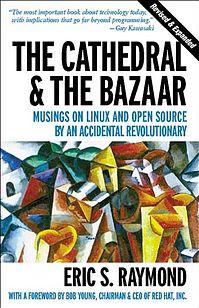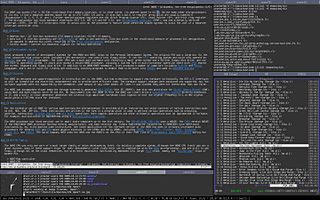
GNU is an extensive collection of free software, which can be used as an operating system or can be used in parts with other operating systems. The use of the completed GNU tools led to the family of operating systems popularly known as Linux. Most of GNU is licensed under the GNU Project's own General Public License (GPL).

A Unix shell is a command-line interpreter or shell that provides a command line user interface for Unix-like operating systems. The shell is both an interactive command language and a scripting language, and is used by the operating system to control the execution of the system using shell scripts.
Open systems are computer systems that provide some combination of interoperability, portability, and open software standards..

The Cathedral and the Bazaar: Musings on Linux and Open Source by an Accidental Revolutionary is an essay, and later a book, by Eric S. Raymond on software engineering methods, based on his observations of the Linux kernel development process and his experiences managing an open source project, fetchmail. It examines the struggle between top-down and bottom-up design. The essay was first presented by Raymond at the Linux Kongress on May 27, 1997 in Würzburg (Germany) and was published as the second chapter of the same‑titled book in 1999.

Solaris is a proprietary Unix operating system originally developed by Sun Microsystems. After the Sun acquisition by Oracle in 2010, it was renamed Oracle Solaris.
In computing, cross-platform software is computer software that is designed to work in several computing platforms. Some cross-platform software requires a separate build for each platform, but some can be directly run on any platform without special preparation, being written in an interpreted language or compiled to portable bytecode for which the interpreters or run-time packages are common or standard components of all supported platforms.
A computing platform, digital platform, or software platform is the infrastructure on which software is executed. While the individual components of a computing platform may be obfuscated under layers of abstraction, the summation of the required components comprise the computing platform.
Linux malware includes viruses, Trojans, worms and other types of malware that affect the Linux family of operating systems. Linux, Unix and other Unix-like computer operating systems are generally regarded as very well-protected against, but not immune to, computer viruses.

CUPS is a modular printing system for Unix-like computer operating systems which allows a computer to act as a print server. A computer running CUPS is a host that can accept print jobs from client computers, process them, and send them to the appropriate printer.

In Unix computing, Ion is a tiling and tabbing window manager for the X Window System. It is designed such that it is possible to manage windows using only a keyboard, without needing a mouse. It is the successor of PWM and is written by the same author, Tuomo Valkonen. Since the first release of Ion in the summer 2000, similar alternative window management ideas have begun to show in other new window managers: Larswm, ratpoison, StumpWM, wmii, xmonad and dwm.

Unix System V is one of the first commercial versions of the Unix operating system. It was originally developed by AT&T and first released in 1983. Four major versions of System V were released, numbered 1, 2, 3, and 4. System V Release 4 (SVR4) was commercially the most successful version, being the result of an effort, marketed as Unix System Unification, which solicited the collaboration of the major Unix vendors. It was the source of several common commercial Unix features. System V is sometimes abbreviated to SysV.

Norton Commander (NC) is a discontinued prototypical orthodox file manager (OFM), written by John Socha and released by Peter Norton Computing. NC provides a text-based user interface for managing files on top of MS-DOS. It was officially produced between 1986 and 1998. The last MS-DOS version of Norton Commander, 5.51, was released on July 1, 1998.

DTrace is a comprehensive dynamic tracing framework originally created by Sun Microsystems for troubleshooting kernel and application problems on production systems in real time. Originally developed for Solaris, it has since been released under the free Common Development and Distribution License (CDDL) in OpenSolaris and its descendant illumos, and has been ported to several other Unix-like systems.

DOS Navigator (DN) is an orthodox file manager for DOS, OS/2, and Windows.

Ploticus is a free, open-source (GPL) computer program for producing plots and charts from data. It runs under Unix, Solaris, Mac OS X, Linux and Win32 systems. Community support is customarily done through Yahoo News Groups.

Linux is a generic name for a family of open-source Unix-like operating systems based on the Linux kernel, an operating system kernel first released on September 17, 1991, by Linus Torvalds. Linux is typically packaged as a Linux distribution (distro), which includes the kernel and supporting system software and libraries, many of which are provided by the GNU Project.

A Unix-like operating system is one that behaves in a manner similar to a Unix system, although not necessarily conforming to or being certified to any version of the Single UNIX Specification. A Unix-like application is one that behaves like the corresponding Unix command or shell. Although there are general philosophies for Unix design, there is no technical standard defining the term, and opinions can differ about the degree to which a particular operating system or application is Unix-like.

Unix is a family of multitasking, multi-user computer operating systems that derive from the original AT&T Unix, whose development started in 1969 at the Bell Labs research center by Ken Thompson, Dennis Ritchie, and others.
The following outline is provided as an overview of and topical guide to the Perl programming language:

ranger is a free and open-source file manager with text-based user interface for Unix-like systems. It is developed by Roman Zimbelmann and licensed under the terms of the GNU General Public License. The program can accomplish file management tasks with a few keystrokes, and mouse input is optional. In conjunction with extensions including the rifle file opener and scope.sh, ranger can be scripted to open files with pre-defined programs, and to display a preview of the selected file by calling external programs.














